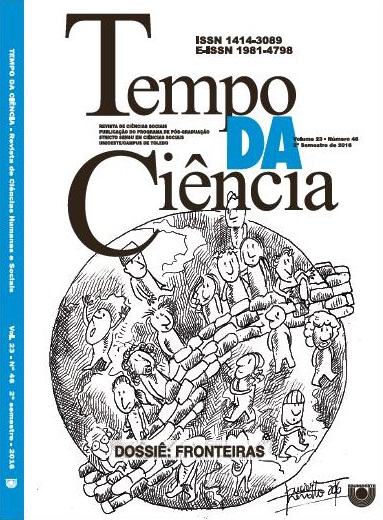Provocações do contexto, interiorização universitária e agendamento institucional: tendências dos Estudos Fronteiriços no Brasil
DOI:
https://doi.org/10.48075/rtc.v23i46.16122Palavras-chave:
Fronteiras, limites, frentes, produção científica.Resumo
Por meio do emprego de métodos qualitativos e quantitativos analisamos pesquisas e pesquisadores que lidam com Estudos Fronteiriços recentes (desde 1990) no Brasil. A informação tem sido coletada à medida que se constrói a base de dados “Unbral Fronteiras – Portal de Acesso Aberto das Universidades Brasileiras sobre Limites e Fronteiras”. No processo, estudiosos do tema das fronteiras foram listados e pediu-se que os mesmos respondessem um questionário. A lista e as respostas permitiram construir um mapa da distribuição espacial dos experts e de seus estudos (ligados principalmente aos arcos Sul e Central) e identificar os principais tópicos (integração; cultura transfronteiriça; infraestrutura e seus limites; fronts) e temas emergentes (fronteiras não-estatais e não administrativas). Concluímos não haver uma metodologia ou uma teoria consensual. Concluímos também tratar-se de um campo de pesquisa em crescimento e haver uma compreensão sólida do objeto (a fronteira internacional). Conceitos (fronteira, limite, cidades-gêmeas) e regionalização (faixa de fronteira, os 3 arcos, díades) são prevalentes e mesmo paradigmáticos. Concluímos que, no Brasil, os Estudos Fronteiriços são um campo de estudos ligados ao contexto marginal de seus pesquisadores. Além disso, encontramos correlações entre as pesquisas e as políticas públicas orientadas para as fronteiras, como comentários ou proposições. Finalmente, concluímos que os estudiosos do tema “Fronteiras” tendem a ser politicamente engajados com seu objeto, o que se expressa em pesquisa situada.Downloads
Publicado
Como Citar
Edição
Seção
Licença
Aviso de Direito Autoral Creative Commons
Política para Periódicos de Acesso Livre
Autores que publicam nesta revista concordam com os seguintes termos:
1. Autores mantém os direitos autorais e concedem à revista o direito de primeira publicação, com o trabalho simultaneamente licenciado sob a Licença Creative Commons Attribution que permite o compartilhamento do trabalho com reconhecimento da autoria e publicação inicial nesta revista.
2. Autores têm autorização para assumir contratos adicionais separadamente, para distribuição não-exclusiva da versão do trabalho publicada nesta revista (ex.: publicar em repositório institucional ou como capítulo de livro), com reconhecimento de autoria e publicação inicial nesta revista.
3. Autores têm permissão e são estimulados a publicar e distribuir seu trabalho online (ex.: em repositórios institucionais ou na sua página pessoal) a qualquer ponto antes ou durante o processo editorial, já que isso pode gerar alterações produtivas, bem como aumentar o impacto e a citação do trabalho publicado (Veja O Efeito do Acesso Livre).
Licença Creative Commons
Esta obra está licenciada com uma Licença Creative Commons Atribuição-NãoComercial-CompartilhaIgual 4.0 Internacional, o que permite compartilhar, copiar, distribuir, exibir, reproduzir, a totalidade ou partes desde que não tenha objetivo comercial e sejam citados os autores e a fonte.

